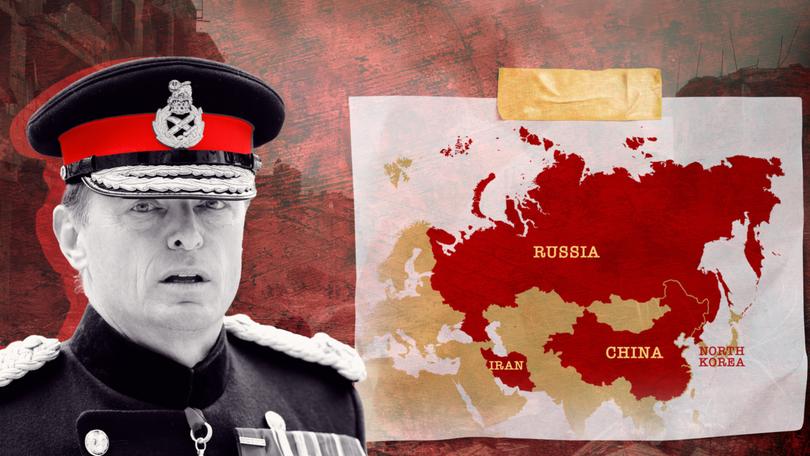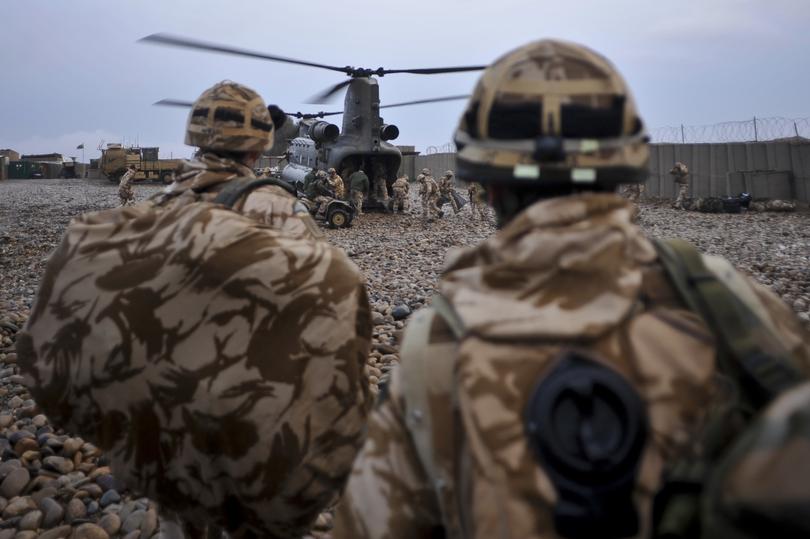General Sir Roly Walker says three years left to prepare for war against China, Russia, North Korea and Iran
A new army boss has issued a grim warning over how long we have to prepare for war, saying we must act with ‘absolute urgency’.

Britain’s new head of army says there are just three years left to prepare for war against the “axis of upheaval” forged by China, Russia, North Korea and Iran and warned that the threats to global security could no longer be confined to the Euro-Atlantic or the Indo-Pacific.
But General Sir Roly Walker told the Land Warfare Conference hosted by the UK defence think tank Royal United Services Institute (RUSI) that the West was not on an “inexorable path to war.”
“But what we do have is an absolute urgency to restore credible hard power in order to underwrite deterrence,” General Walker said in his first speech since assuming the Chief of Defence Staff role in June.
Sign up to The Nightly's newsletters.
Get the first look at the digital newspaper, curated daily stories and breaking headlines delivered to your inbox.
By continuing you agree to our Terms and Privacy Policy.“We probably do have just enough time … to prepare, act and re-establish credible land forces to support [the] strategy of deterrence.”
He said for Britain, the army needed to double, at least, its fighting power in that time so that no aggressor would start a conflict, and that if they did, they would be deprived of a quick win.
In a separate briefing with journalists, he said that by 2027 the West could be faced with multiple major authoritarian threats converging and overwhelming the West’s ability to respond.
This is the same year that Chinese President Xi Jinping has ordered the People’s Liberation Army to be ready to take Taiwan and with force, if necessary.
Some analysts believe that within that timeframe the war in Ukraine may be closer to a resolution.
“It’s not a question of Euro-Atlantic of the Indo-Pacific anymore,” General Walker said.
“The point about this convergence of the threat is that it’s the same problem seen from different sides of the world and it takes a global response to deal with it.
“So it may well be that the best way to deter the Chinese from taking Taiwan is to ensure Putin’s invasion of Ukraine fails.”
While Russia has made more gains against Ukraine in recent weeks, the toll has been enormous.
Admiral Tony Radakin, Chief of the Defence Staff and principal military adviser to the UK’s Prime Minister and Defence Secretary said Russia’s losses totalled 550,000 men and that it would take five years to rebuild the Russian army to where it was on the day of the invasion in February 2022.
General Walker said that regardless of how and when the war in Ukraine ended, Russia had a history of roaring back after crises and would be intent on retribution against those who had armed Ukraine.
“The lesson from history is that the Russians don’t forget and they will come back to get revenge,” he said.
While Russia, China, Iran and North Korea are not allies, they have increased their cooperation with each other since Russian President Vladimir Putin’s invasion of Ukraine.
This includes North Korea and Iran supplying Russia with weapons, including munitions and drones, and China increasing its Russian imports as well as selling to Russia goods that can be used for both everyday and military purposes. This has made Russia dependent on China.
General Walker added that Putin’s enduring motivation was wanting to break up the trans-Atlantic defensive alliance NATO.
Earlier this month, the former Home Affairs boss, and author of Australia’s the 2009 Defence White Paper Mike Pezzullo said he believed the prospect of conflict in the Indo-Pacific had doubled to a one-in-five chance, calculations he described as “horrifying and terrifying.”
Ukraine’s retired General and former Commander-in-Chief Valerii Zaluzhnyi, who fell out with President Volodymyr Zelensky and was subsequently sent to London as Ambassador, made his first public appearance as a diplomat at the conference.
He said democracies needed to “wake up and think about how to protect their citizens and countries.”
“Wars must be avoided but if it does come you need to be ready for it,” he said, speaking through a translator.
“Perhaps the most difficult and the most important component is the society readiness.
“Society must agree to temporarily give up a number of freedoms for the sake of survival.”
But the warnings are set against the backdrop of underprepared defence forces in both Britain and Australia.
In the UK, the new Labour government has commissioned a year-long Defence Strategic Review that has already prompted fears key programs aimed at building capability in the Indo-Pacific could be cut to pay to restore hollowed-out forces.
On Monday, the new Defence Secretary John Healey told the conference that since coming into office he had discovered the situation was worse than feared.
“I have to tell you, two weeks into this Government, we now also see that the problems are much worse than we thought,” he said.

He urged internal rivalries between the army, navy and air force to cease and said he wanted to work across the political divide on defence.
“It’s why I’ve already offered the Shadow Defence Secretary access to intelligence briefings and will I do so to other relevant members of Parliament,” he said.
“And that’s why the Strategic Defence Review will brief and will welcome contributions from other political parties and from across the defence community.”
Labour has committed to raising Britain’s defence spending to 2.5 per cent of GDP but is facing criticism for not stating by when it will meet its goal.
One program that has been speculated that could be in for the chop is the project to build a new fighter jet with Japan and Italy.
The new government has not confirmed or denied the speculation. On Tuesday, Healey met his Italian and Japanese counterparts to discuss the program.
In a statement after the meeting, he said the UK would continue to work closely with international partners on the important program and that progress was continuing on the next steps.
“We discussed the program made on Global Combat Air Programme including the skills we are developing in our respective nations and the economic growth potential for the programme,” he said.

